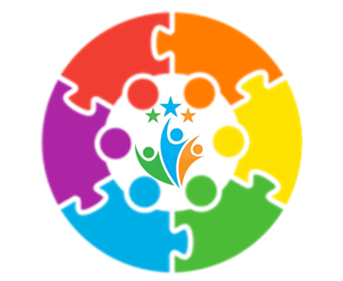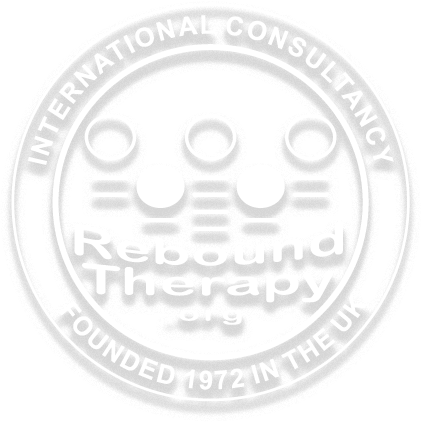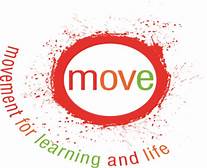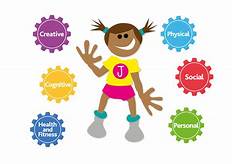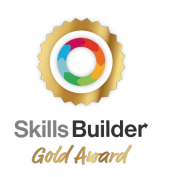Core- Maths
Intent
At Nancealverne, we believe maths to be a key life skill that supports pupils throughout their daily lives, at school, in the wider community and throughout their future lives. We aim to build all pupils’ skills in the fundamentals of maths, their fluency and ability to reason and problem solve, providing high quality, individualised learning opportunities that encompass pupils’ interests and preferred learning styles. Through a mastery approach, our maths offer ensures that all pupils have access to high quality teaching and learning of mathematics that encourages pupils to fully embed developed skills in their long-term memory, use the key vocabulary obtained appropriately and apply their learnt skills to solve problems within their everyday lives with greater confidence and fluency.
In addition, we are a Financial Centre of Excellence, offering relevant, real-life opportunities for pupils to develop their financial understanding and prepare them for life outside school.
Implementation
|
Our maths learning encompasses 3 main areas: number (including calculation and statistics), measurement (including time and money) and Geometry, with an additional focus on financial understanding. Maths is delivered both in discrete lessons throughout the week and holistically across each day, with all staff ensuring that opportunities for maths learning are maximised (both within structured and unstructured sessions).
Maths learning begins informally, through play, in our EYFS group, becoming more formal as we progress through the key stages. Maths is delivered as a core subject from KS1-KS4, underpinned through a mastery approach, with opportunities to gain formal qualifications (e.g. Asdan and Ed Excel Functional Skills) in KS4and KS5, as well as developing students’ preparedness for adulthood through application of skills to increasingly complex real-life situations. Teaching and learning is highly personalised with individual pupil starting points taken into account and the use of learning pathways to support progress. These pathways start with pre-formal learners (on our learning to learn pathway), who are taught holistically, moving through a semi-formal pathway (with a focus on topic-based learning through multi-sensory play, games, TEAACH activities and rhymes/songs), to formal curriculum pathways (ready to learn), with a greater focus on discrete curriculum sessions.
Within the pathways, all new learning begins with use and exploration of concrete resources (e.g. real objects, Numicon, Diennes blocks, shapes), moving to pictorial representations and structures (e.g. 10s frames, number lines, models and images), and on towards abstraction. This sequence is fluid and teaching moves between concrete, pictorial and abstract throughout learning sessions and units of work, ensuring that pupils are supported and learning is scaffolded to ensure maximum progress and challenge. There is a focus on practical, engaging and fun lessons where pupils are encouraged to talk, share ideas and to focus on the use of mathematical vocabulary to reason and explain. Communication opportunities are maximised in all sessions and learning supported through use of pictures, symbols, signs and AAC devices. Varied contexts are explored, taking into account pupils’ interests and using real-life scenarios and opportunities. As part of our commitment to Financial Education, we operate a weekly school tuck shop in which pupils across the school are able to practice their money skills in a supportive, real life environment, whether purchasing items, shopping or cooking food or serving others. We also have a School Savings Bank, run weekly in conjunction with Kernow Credit Union, encouraging pupils to save regularly. Finally, we hold an annual Enterprise Week, in which we encourage all classes to research, make and produce items for sale at an end of week event. This always creates a real buzz around the school and offers valuable insights into the world of work as well as promotes financial skills (e.g. budgeting, keeping track of money, pricing, etc.)
In EYFS and early KS1, there is a focus on learning through play, stories and songs using a range of indoor and outdoor contexts, including an outdoor mud kitchen and regular welly walks to observe changes in the local environment. Early number concepts such as subitising and the 5 counting principles are introduced alongside exploration of shapes, space, measures and early calculation using a range of motivating resources and activities, both structured and unstructured, with all pupils working towards the Development Matters Early Learning Goals. |
|
|
In Key Stages 1-3, there is a continued focus on individual starting points, but learning becomes more formal as students progress (in ready to learn cohorts). We use White Rose Maths and NCETM mastery frameworks and resources to support learning, but individual class teachers plan and deliver their own motivating ‘small step’ sessions with effective differentiation and use of appropriate resources, models and images. |
|
|
In Key Stages 4-5, pupils study functional Maths, focusing on opportunities to apply learnt mathematical skills in increasingly wider contexts within the broad areas of number, measurement and geometry. The term ‘functional’ is considered in the broadest sense of providing students with the skills & abilities they need, encouraging growing independence and problem solving using real life contexts and situations. Sessions prepare them well for their next steps (whether on to college or community provision) and encourage pupils to take an active role in their communities, enabling them to become effective and involved citizens. Pupils work towards either ASDAN Accreditations, Ed Excel Functional Skills Entry Levels 1-3 and, if appropriate, Ed Excel Level 1 or 2 Qualifications |
|
|
Pre-Formal Pathway (Learning to Learn): Pupils in Maple class have complex health needs and need close support at all times. Pupils are primarily on the Learning to Learn Pathway and are taught holistically through termly topics. Within this structure,
|
Impact
|
At Nancealverne, the overwhelming majority of pupils make expected or above expected progress towards challenging targets. Pupils’ learning is embedded and secure, enabling them to solve problems and to reason mathematically, preparing them effectively for the next stage of their learning and, ultimately, for life beyond school. Effective curriculum planning allows for smooth transition between key stages, with clear progressions mapped across the key stages. Pupils leave school well prepared for the next stage in their lives, able to live as independently as possible within their communities. Ongoing formative assessment is supported by termly data collection and analysis to ensure that pupils’ progress is maximised through early interventions and additional challenge. Interventions are planned, monitored and assessed for both higher and lower attaining pupils to ensure that all pupils’ progress is optimal. Progress in lessons and across the day is evidenced in individual pupil workbooks and/or via Evidence for Learning, producing learning journeys of pupils’ experiences and achievements. EYFS use the Cherry Garden Assessment to assess progress and develop learning journeys using Evidence for Learning to evidence their progress within maths. Key Stages 1-3 use B Squared Proprietary Assessment software to record and evidence progress, alongside work books and pictorial evidence (again through Evidence for Learning). Progress data is recorded termly through assigning levels of achievement (e.g. gaining skills, achieved, mastered) to progressive learning objectives (both pre and differentiated, small step National Curriculum objectives) on steps ranging from 1-10. Pupils in Key Stages 4-5 work towards ASDAN Personal Progress Accreditations or Ed Excel Functional Skills Entry Level qualifications, with the opportunity to work towards Levels 1 and 2 Functional Skills or GCSE if appropriate.
|
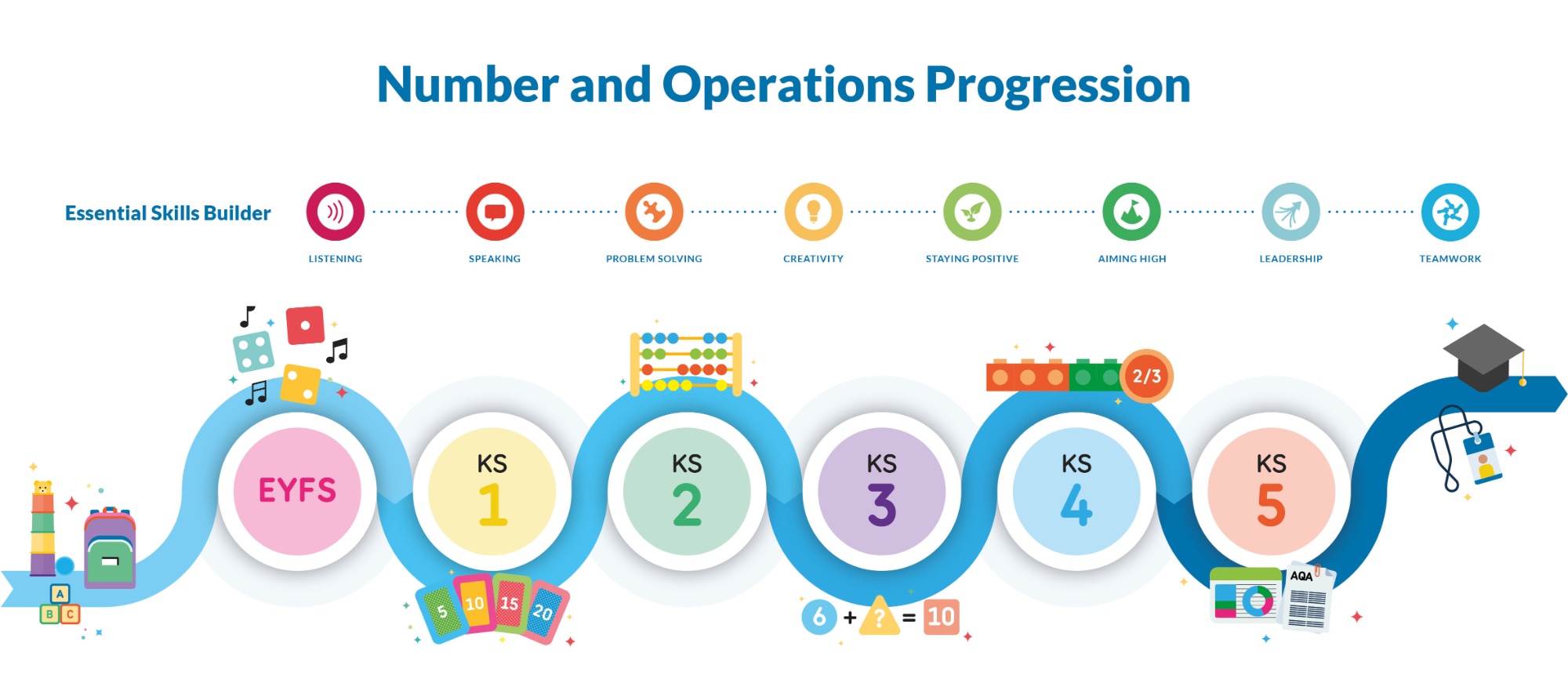
Early Years Foundation Stage (EYFS):
- Begin to develop basic number, counting and ordering skills to 10.
- Begin to recognise small quantities (through subitising and then counting).
- Explore and organise objects, partitioning and recombining.
- Begin to solve practical problems, adding and taking away objects.
Key Stage 1 (KS1):
- Continue to develop number, counting and ordering skills to 20.
- Count in 1s, 2s, 5s and 10s.
- Count objects to 20 in different contexts and layouts.
- Begin to compare numbers and amounts of objects.
- Add and take away within 20.
- Begin to develop understanding of place value.
- Make equal groups of objects and share them.
- Explore number patterns.
- Solve simple practical problems and start to explain thinking.
- Find half of an object or quantity.
Key Stage 2 (KS2):
- Become more confident in ordering, counting and comparing numbers to 100.
- Count fluently in 2s, 5s and 10s and begin to know times tables.
- Develop understanding of place value, partitioning and recombining numbers in different ways.
- Add and subtract numbers to 100.
- Become more confident with early multiplication and division using practical apparatus.
- Solve simple problems and begin to reason mathematically.
- Recognise, find and name simple fractions.
Key Stage 3 (KS3):
- Count, order, read and write numbers to 1,000.
- Count in 3s, 4s, 8s, 50s and 100s.
- Begin to know multiplication and division facts for all times tables.
- Use place value skills to compare numbers, to multiply/divide by 10/100 and to round.
- Begin to use formal written methods for addition and subtraction.
- Solve problems using 4 operations and reason mathematically.
- Compare, add and subtract simple fractions.
- Begin to use decimals (money).
Key Stage 4 (KS4):
- Count, order, read and write numbers to 10,000 with increasing fluency.
- Count in 6s, 7s, 9s, 25s and 1000s.
- Know multiplication and division facts for times tables.
- Use negative numbers.
- Solve increasingly complex number problems in a range of contexts.
- Add and subtract using formal written methods.
- Multiply and divide mentally and begin to use formal written methods for multiplication.
- Estimate and use inverse operations to check answers.
- Compare and order fractions and convert to decimals.
Key Stage 5 (KS5):
- Count, order, read and write numbers to 100,000.
- Know times tables and use in calculation.
- Use formal written methods for all 4 operations.
- Reason and solve problems in a range of contexts using efficient calculation strategies.
- Convert fractions to decimals and use percentages and ratio.
- Use simple formulae.
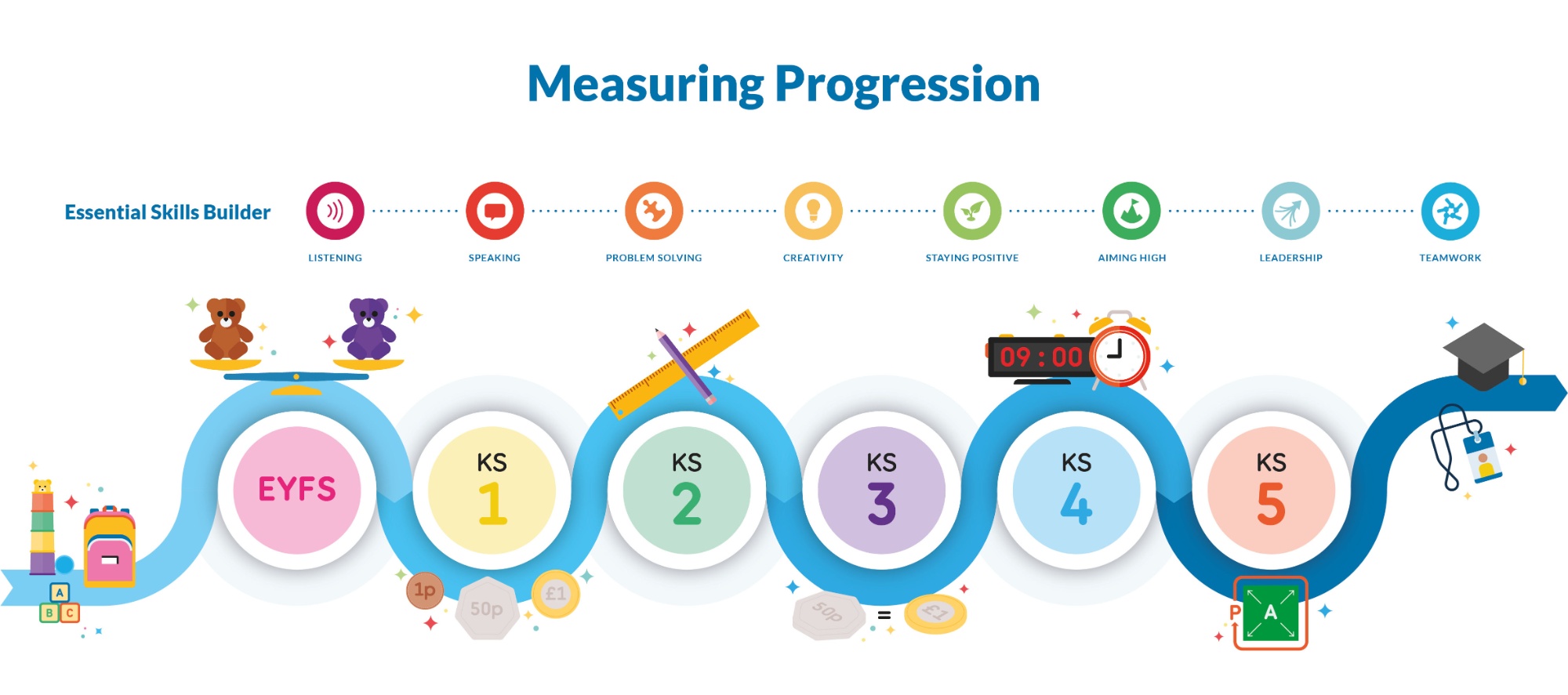
Early Years Foundation Stage (EYFS):
- Compare 2 objects/items practically in terms of size, weight or capacity (eg. big/small, heavy/light).
- Begin to sequence events (2 or 3 pictures/symbols).
- Begin to tell the time to the hour.
- Begin to recognise some coins.
Key Stage 1 (KS1):
- Begin to measure using non-standard and then standard units.
- Compare, describe and begin to solve practical problems.
- Sequence events using language of time.
- Tell the time to the hour and begin to know half-past.
- Recognise coins and begin to know value.
Key Stage 2 (KS2):
- Choose and use appropriate standard units to estimate and measure.
- Compare and order simple measures.
- Begin to compare and sequence intervals of time.
- Tell the time to quarter hour and begin to understand duration.
- Recognise coins and notes.
- Recognise coins and notes.
- Make equivalent amounts.
Key Stage 3 (KS3):
- Measure, compare, add and subtract measures.
- Calculate perimeter of simple 2D shapes.
- Estimate and read time with increasing accuracy.
- Record and compare time using analogue and digital clocks.
- Combine coins to make amounts and solve simple practical problems including giving change.
Key Stage 4 (KS4):
- Estimate, compare and calculate different measures, including money in pounds and pence.
- Convert between different units of measure.
- Calculate perimeter and start to find area.
- Read, write and convert between analogue and digital 12 and 24 hour clocks.
- Solve problems involving duration of time.
Key Stage 5 (KS5):
- Use all four operations to solve problems involving measure (length, volume, mass, money) using decimal notation.
- Calculate perimeter of composite shapes and calculate and compare area of 2D shapes.
- Understand equivalences between metric and imperial units.
- Solve problems involving converting between units of time.
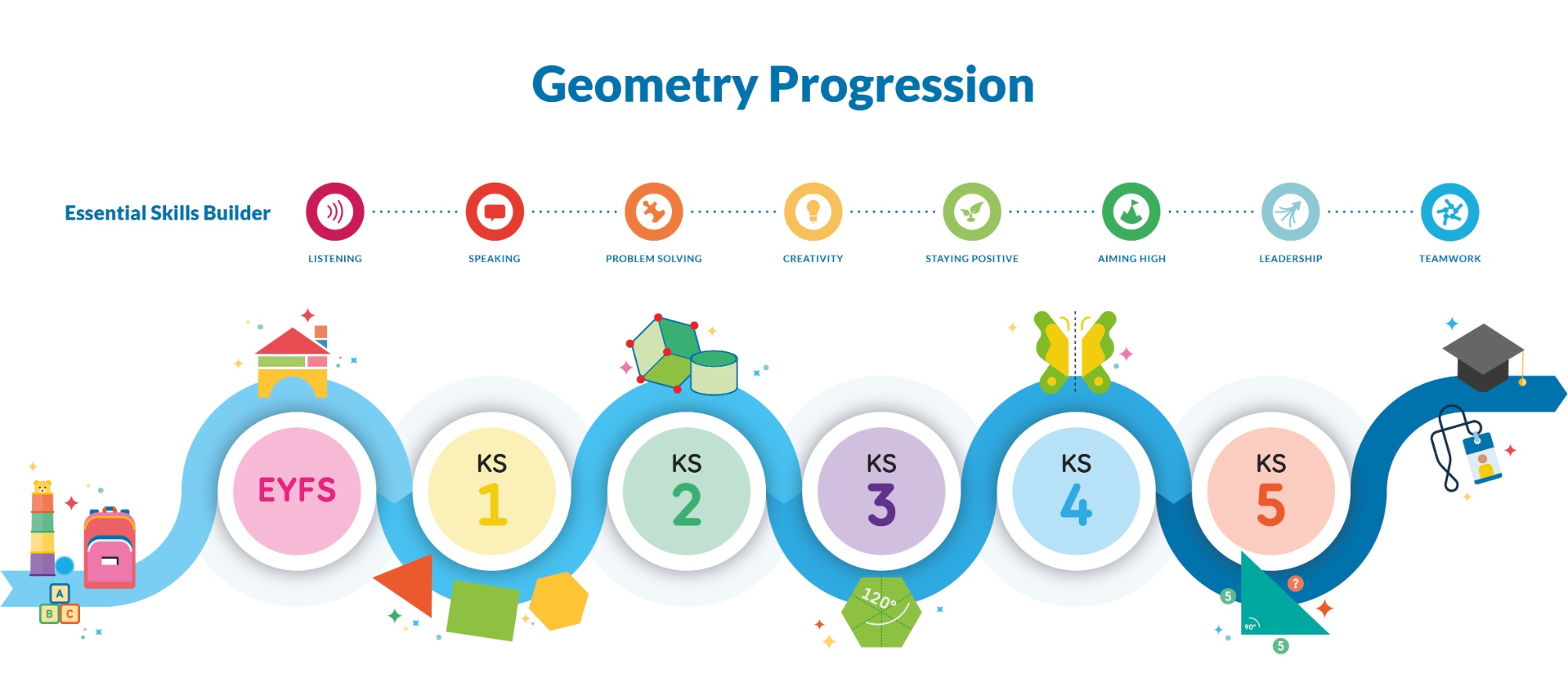
Early Years Foundation Stage (EYFS):
- Talk about and explore 2D and 3D shapes using informal language.
- Use shapes in pictures.
- Continue and copy simple repeating patterns.
- Combine shapes to make new ones.
- Begin to understand simple positional language.
Key Stage 1 (KS1):
- Begin to recognise and name common 2D and 3D shapes.
- Begin to explore properties of shapes.
- Begin to describe position, direction and movement using everyday language.
- Continue, copy and create patterns of objects and shapes.
Key Stage 2 (KS2):
- Identify and describe properties of 2D and 3D shapes.
- Begin to recognise lines of symmetry in 2D shapes.
- Compare and sort common shapes and everyday objects.
- Begin to use mathematical vocabulary to describe position, direction and movement, including rotation.
- Order and arrange objects in patterns and sequences.
Key Stage 3 (KS3):
- Draw 2D shapes and make 3D shapes using modelling materials.
- Recognise 3D shapes in different orientations and describe them.
- Identify horizontal, vertical and perpendicular lines.
- Recognise and identify right angles and whether angles are greater or less than a right angle.
Key Stage 4 (KS4):
- Compare and classify geometric shapes based on properties and sizes.
- Identify acute and obtuse angles and compare and order angles by size.
- Identify lines of symmetry in 2D shapes in different orientations.
- Describe positions on a 2D grid.
- Plot points and draw sides to complete a polygon.
Key Stage 5 (KS5):
- Identify 3D shapes from 2D representations.
- Draw given angles and measure in degrees.
- Estimate and compare angles Use the properties of rectangles to deduce facts and find missing lengths/angles.
- Distinguish between regular and irregular polygons using reasoning.
- Reflect and translate shapes.
Whilst we follow the objectives of a structured subject-specific curriculum, we offer highly differentiated and personalised learning programmes. We deliver a specialist, high-quality, and relevant education. This focuses on personal skills and academic achievement, setting high expectations for all. We appreciate that students may not be working at age-related or key-stage expectations, and therefore measure progress from individual starting points.

